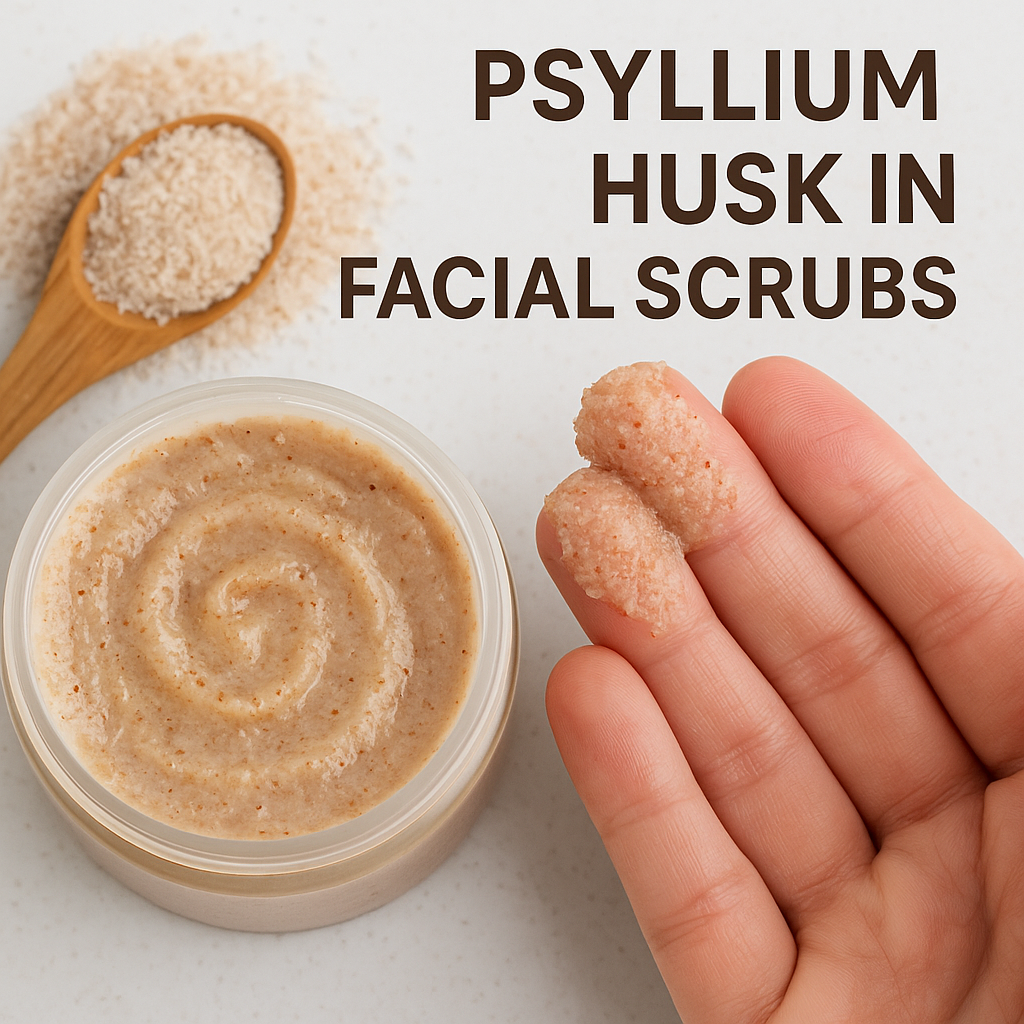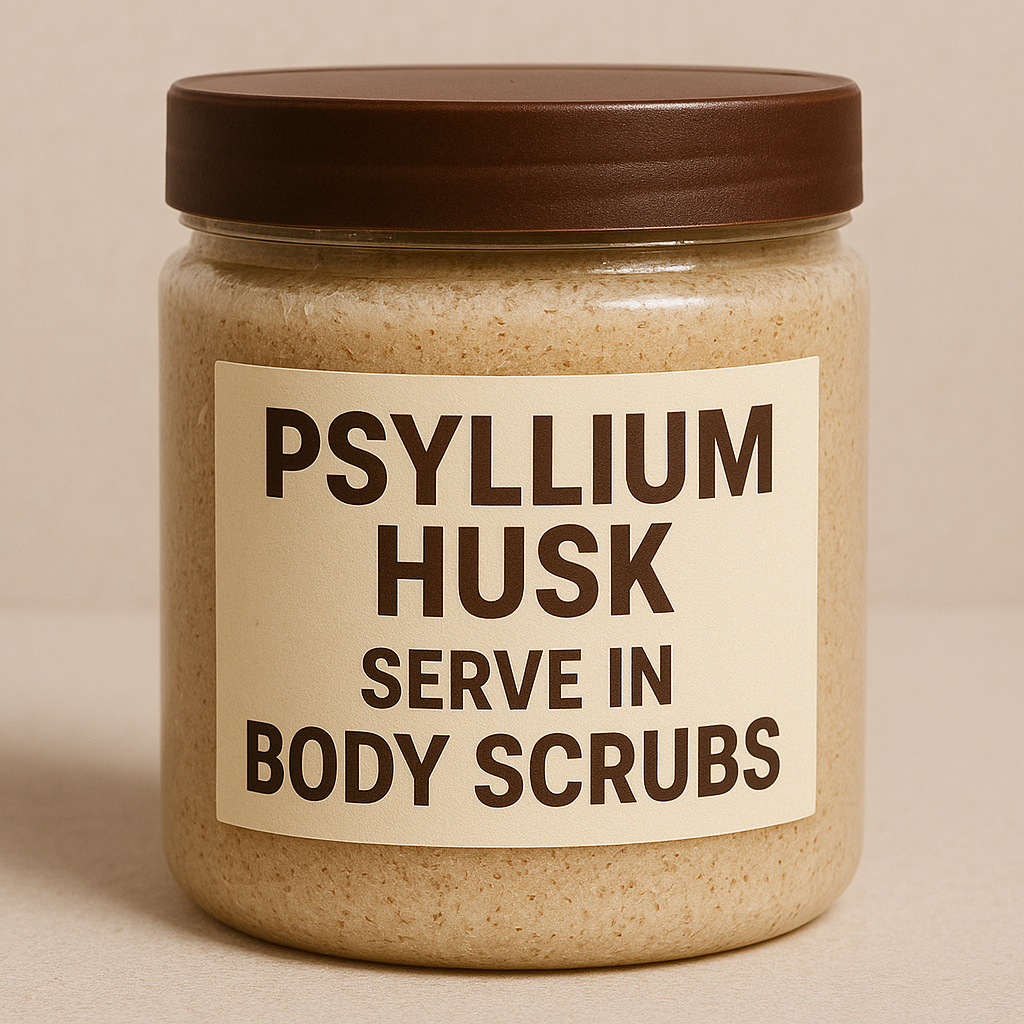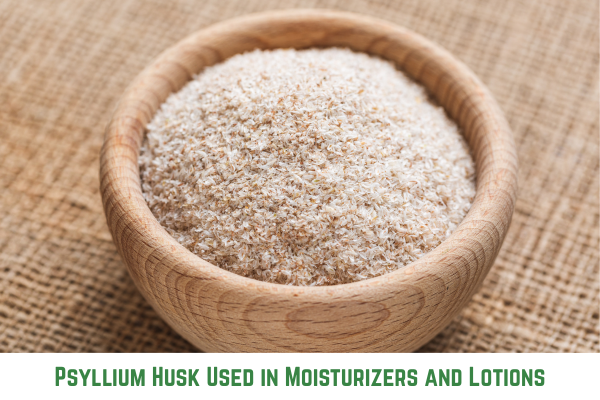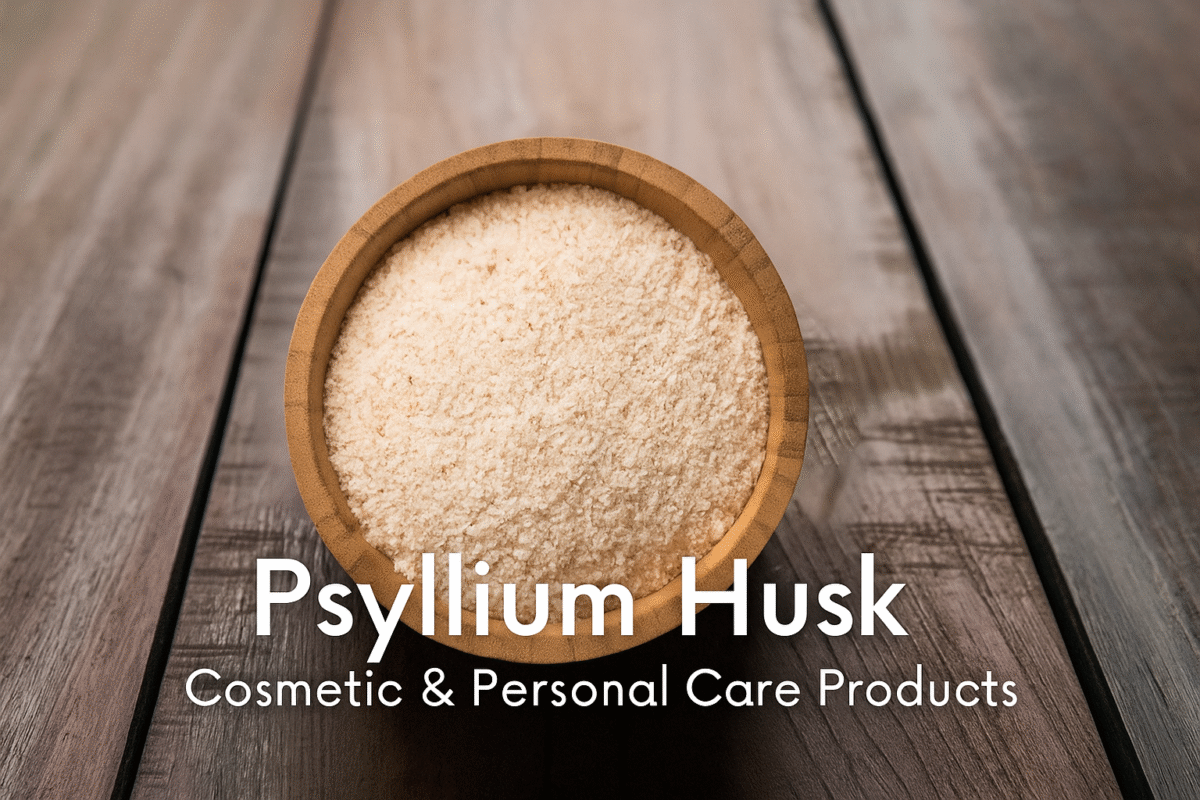Table of Contents
Psyllium husk, derived from the seeds of the Plantago ovata plant, is widely recognized for its digestive health benefits, but its applications extend beyond the realm of dietary supplements and pharmaceuticals. In recent years, psyllium husk has found its way into the world of cosmetics and personal care products, owing to its remarkable natural properties. From its ability to hydrate and exfoliate the skin to its role as a thickener and binder in various formulations, psyllium husk is gaining popularity in beauty and grooming products.
This article explores different cosmetic and personal care products where psyllium husk is used, showcasing how it benefits formulations in ways that enhance both performance and the consumer experience. Whether it’s in moisturizers, facial scrubs, shampoos, or sunscreens, psyllium husk proves to be a versatile and natural ingredient that meets the growing demand for clean-label, eco-friendly, and effective personal care products. Let’s dive into each product category and discover the unique role psyllium husk plays in elevating cosmetic formulations.
What Role Does Psyllium Husk Play in Facial Scrubs?
Facial scrubs are one of the most popular skincare products used to exfoliate dead skin cells and promote a smoother complexion. Psyllium husk is increasingly being used in facial scrubs due to its natural exfoliating properties. Psyllium husk’s fine powder is gentle on the skin while effectively removing impurities and dead skin cells, making it ideal for sensitive skin. Its ability to absorb moisture and form a gel-like substance when mixed with water allows it to act as a natural binder in facial scrubs, providing the right consistency for even application.
Psyllium husk is also beneficial because it helps to retain moisture in the skin while exfoliating. This dual action ensures that the skin remains hydrated and smooth after use, preventing the harsh dryness that sometimes follows exfoliation with other materials.

Additionally, the gentle exfoliation process ensures that the skin’s barrier is not damaged, making it suitable for individuals with more delicate or acne-prone skin. As facial scrubs become a crucial part of daily skincare routines, the addition of psyllium husk brings a natural, effective, and skin-friendly element to these formulations.
How is Psyllium Husk Used in Shampoos and Conditioners?
Psyllium husk’s benefits extend to hair care, especially in shampoos and conditioners. It is known for its ability to thicken formulations and enhance hair texture without causing harm to the scalp or hair fibers. In shampoos, psyllium husk acts as a natural thickener, adding viscosity to the product while retaining its lightweight feel. The natural fibers in psyllium also help coat the hair strands, providing a smooth and silky finish.
In conditioners, psyllium husk acts as a moisturizing agent that nourishes the hair from root to tip. Its water-retention properties help hydrate the hair, making it look healthier and shinier. Psyllium husk also has anti-inflammatory properties, which soothe the scalp and can help reduce irritation or dryness, particularly for those with sensitive or dandruff-prone scalps. As a result, it is increasingly incorporated into eco-friendly and natural hair care products, aligning with the clean-label trends in the beauty industry.
Can Psyllium Husk Be Found in Lip Balms and Lip Care Products?
Psyllium husk is an excellent ingredient in lip care products, including lip balms and lip masks, due to its hydrating and protective properties. In lip balms, psyllium husk serves as a natural humectant, attracting moisture to the lips and helping them stay soft and hydrated for longer periods. It also provides a smooth texture that makes application easier and more effective.
Furthermore, psyllium husk helps form a protective barrier on the lips, shielding them from environmental elements such as dry air, harsh winds, or pollution. This barrier effect ensures that lips remain moisturized and protected, preventing chapping and cracking, especially in harsh climates. With the growing demand for natural, clean-label personal care products, psyllium husk is becoming a key ingredient in many lip care formulations due to its versatility and moisturizing capabilities.
How is Psyllium Husk Used in Anti-Aging Creams and Serums?
Anti-aging skincare products are often formulated with ingredients that help to hydrate, firm, and smooth the skin. Psyllium husk plays a unique role in anti-aging creams and serums by contributing to these effects. As a powerful humectant, psyllium husk draws moisture into the skin, helping to plump and hydrate it. This action reduces the appearance of fine lines and wrinkles, giving the skin a more youthful and radiant look.
Psyllium husk also aids in improving skin elasticity by providing essential nutrients that support the skin’s natural structure. As a natural source of fiber, it can help to stimulate collagen production, which is crucial for maintaining the skin’s firmness and youthful appearance. Many anti-aging formulations incorporate psyllium husk due to its ability to nourish the skin while offering a natural alternative to synthetic, harsh chemicals. This has made it a preferred ingredient in clean beauty brands focused on providing age-defying results with gentle, skin-loving ingredients.
What Function Does Psyllium Husk Serve in Body Scrubs?

Psyllium husk is often included in body scrubs for its gentle exfoliating properties and its ability to retain moisture. Body scrubs are essential in removing dead skin cells and revealing smoother, softer skin. Psyllium husk’s fine powder texture makes it a perfect addition to body scrubs, where it works to exfoliate without irritating the skin. Unlike harsher exfoliants like salt or sugar, psyllium husk is less abrasive, making it suitable for all skin types, including sensitive or dry skin.
In addition to its exfoliating action, psyllium husk helps to retain moisture in the skin, which is vital for post-scrub hydration. This helps to prevent the skin from feeling dry or tight after exfoliation. The gel-like texture that psyllium creates when mixed with water helps to deliver a smoother scrub experience, providing better spreadability and effectiveness.
As consumers seek more gentle yet effective body scrubs, psyllium husk has become an essential ingredient for those looking for natural, skin-friendly exfoliants.
How Does Psyllium Husk Contribute to Face Masks and Sheet Masks?
Psyllium husk is increasingly used in face masks and sheet masks due to its ability to form a gel-like texture when mixed with water. This unique property allows psyllium husk to create a smooth and evenly spreadable mask that adheres well to the skin. In face masks, psyllium helps in tightening and firming the skin, providing an instant lifting effect. This makes it especially popular in anti-aging and skin-firming formulations.
Additionally, psyllium husk’s natural moisture-binding properties help hydrate the skin while providing a gentle cleanse. It also aids in the removal of toxins and impurities from the skin, acting as a natural detoxifier. When included in sheet masks, psyllium enhances the mask’s effectiveness by ensuring that it sticks to the skin, while also helping to retain moisture in the skin over time. As face masks continue to be a popular part of skincare routines, the inclusion of psyllium husk helps to make these products more effective, natural, and soothing.
In What Way is Psyllium Husk Used in Moisturizers and Lotions?
Psyllium husk is often incorporated into moisturizers and lotions due to its ability to attract and retain moisture in the skin. As a natural humectant, psyllium husk binds water to the skin, helping to keep the skin hydrated for longer periods. This makes it an essential ingredient in products formulated for dry or dehydrated skin, as it provides continuous hydration without feeling greasy or heavy on the skin.

Psyllium husk also contributes to improving the texture of moisturizers and lotions, giving them a smooth and non-greasy consistency. By forming a protective barrier on the skin’s surface, psyllium helps lock in moisture, reducing water loss throughout the day. Furthermore, its gentle nature makes it suitable for sensitive skin, ensuring that moisturizers and lotions containing psyllium are safe for daily use.
As demand for natural and clean-label skincare products grows, psyllium husk’s inclusion in moisturizers and lotions offers consumers an effective, plant-based solution for maintaining healthy, hydrated skin.
How Does Psyllium Husk Benefit in Hair Styling Gels and Creams?
In hair styling gels and creams, psyllium husk serves as a natural binder and thickening agent that helps to provide texture, hold, and volume to hair products. Psyllium husk’s ability to form a gel-like substance when mixed with water makes it an ideal ingredient for hair gels, where it offers a flexible yet firm hold without the stiffness often associated with synthetic alternatives. This provides a more natural finish, making the hair look styled but not over-styled or crunchy.
Moreover, psyllium husk is gentle on the hair and scalp, which is essential for people with sensitive skin or scalp issues. Its natural conditioning properties also help to nourish the hair, keeping it soft and smooth while maintaining the styling effect. In hair creams, psyllium husk works to create volume and fullness, making it a popular ingredient in volumizing and texturizing hair products. By incorporating psyllium into hair styling products, manufacturers can offer consumers a more natural option for achieving well-styled, healthy-looking hair.
Can Psyllium Husk Be Used in Sunscreens and Sun Protection Products?
Yes, psyllium husk can be found in some sunscreens and sun protection products due to its ability to enhance the formulation’s texture and provide additional skin benefits. While psyllium does not directly contribute to UV protection, its natural properties help improve the spreadability and adherence of sunscreen products. Its ability to form a gel-like consistency helps ensure that sunscreen is evenly distributed across the skin, offering better coverage and enhancing the product’s overall performance.
Moreover, psyllium husk has a soothing and hydrating effect on the skin, which is especially beneficial after sun exposure. By retaining moisture and forming a barrier on the skin, psyllium husk helps prevent the drying effects that can occur after sunbathing. Some sunscreens are also formulated with additional skin-healing ingredients, and psyllium husk complements these ingredients by ensuring that the skin remains nourished and hydrated, making it an essential part of sunscreen formulations for sensitive or dry skin.
How is Psyllium Husk Utilized in Facial and Body Cleansers?
Psyllium husk is increasingly being used in facial and body cleansers due to its natural ability to cleanse and purify the skin. As a gentle exfoliant, psyllium helps to remove dead skin cells and impurities without causing irritation or stripping the skin of its natural oils. This makes it particularly useful in facial cleansers, where it provides a mild exfoliating effect while still being safe for sensitive skin types.
In body cleansers, psyllium husk’s water-binding properties allow it to create a hydrating and softening effect, ensuring that the skin remains moisturized after cleansing. Its inclusion in cleansers helps to balance the skin’s natural moisture levels while delivering a deeper cleanse. Additionally, psyllium husk can help soothe inflamed skin, making it ideal for those suffering from conditions like eczema or psoriasis. As the trend for natural, gentle, and effective skincare grows, psyllium husk’s role in facial and body cleansers is likely to continue expanding, offering consumers a more holistic solution to maintaining healthy, clean, and hydrated skin.



